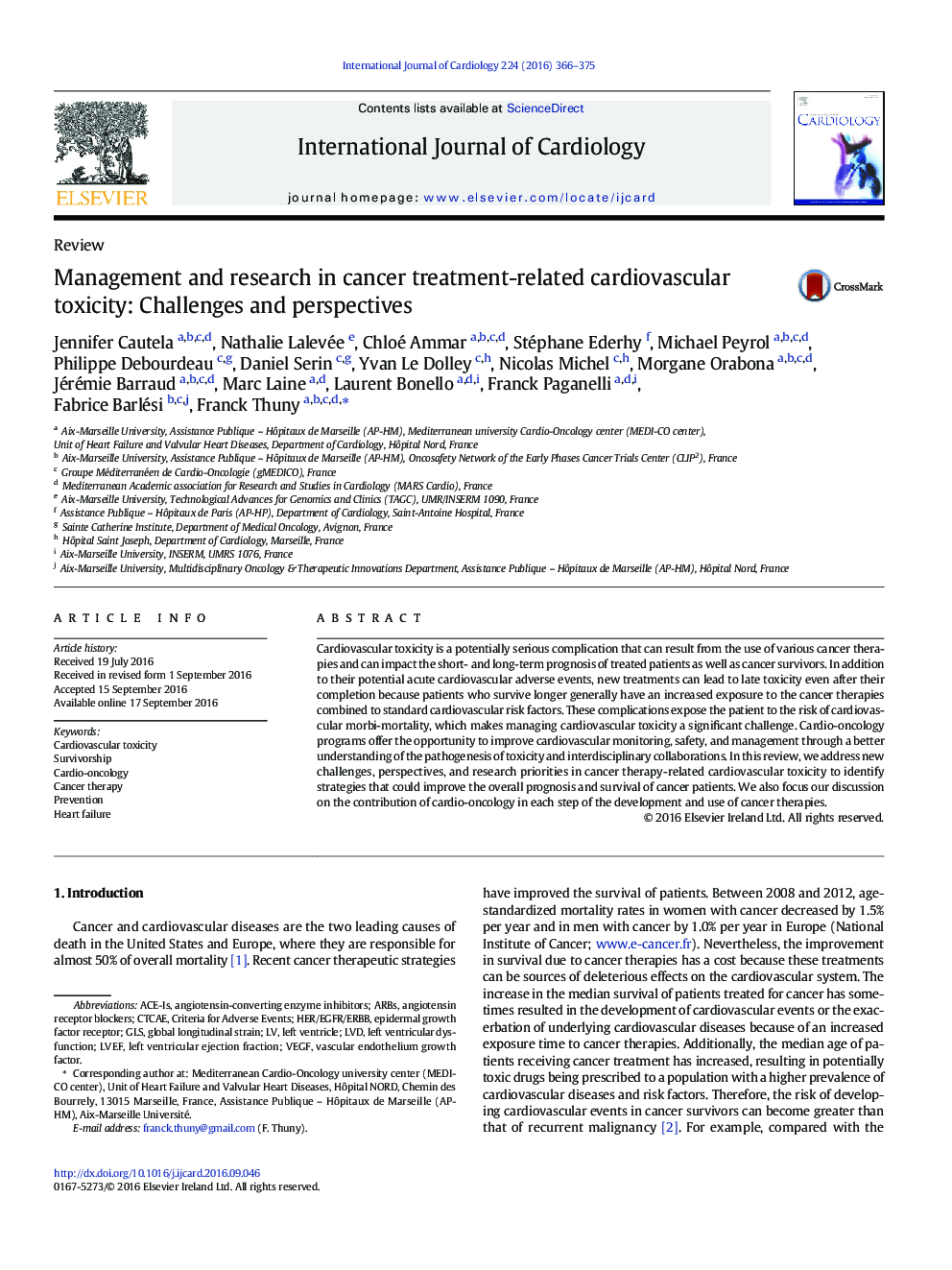| کد مقاله | کد نشریه | سال انتشار | مقاله انگلیسی | نسخه تمام متن |
|---|---|---|---|---|
| 5962320 | 1576124 | 2016 | 10 صفحه PDF | دانلود رایگان |
عنوان انگلیسی مقاله ISI
Management and research in cancer treatment-related cardiovascular toxicity: Challenges and perspectives
ترجمه فارسی عنوان
مدیریت و تحقیق در مورد سمیت قلبی عروقی مرتبط با سرطان: چالش ها و دیدگاه ها
دانلود مقاله + سفارش ترجمه
دانلود مقاله ISI انگلیسی
رایگان برای ایرانیان
کلمات کلیدی
LVDGLSLVEFCTCAEARBs - ARB هاangiotensin-converting enzyme inhibitors - آنژیوتانسین تبدیل آنزیم مهار کنندهleft ventricular dysfunction - اختلال در بطن چپSurvivorship - بازماندگیleft ventricle - بطن چپCancer therapy - سرطان درمانCardiovascular toxicity - سمیت قلبی عروقیVascular Endothelial Growth Factor (VEGF) - فاکتور رشد اندوتلیال عروقی (VEGF)Vascular Endothelium Growth Factor - فاکتور رشد اندوتلیوم عروقیGlobal longitudinal strain - فشار طولی جهانیCardio-oncology - قلب و عروقAngiotensin receptor blockers - مسدود کننده های گیرنده آنژیوتانسینheart failure - نارسایی قلبیPrevention - پیشگیریleft ventricular ejection fraction - کسر خروجی بطن چپEpidermal growth factor receptor - گیرنده فاکتور رشد اپیدرمال
ترجمه چکیده
سمیت قلبی عروقی یک عوارض بالقوه جدی است که می تواند از استفاده از درمان های مختلف سرطان حاصل شود و می تواند پیش آگهی کوتاه مدت و بلند مدت بیماران درمان شده و همچنین بازماندگان سرطانی را تحت تاثیر قرار دهد. علاوه بر حوادث حاد بالقوه عوارض قلبی عروقی، درمان های جدید می تواند به حتی پس از اتمام آن به سمی بودن دیررس منجر شود، زیرا بیماران که طول عمر بیشتری دارند، معمولا در معرض درمان های سرطانی قرار دارند که به عوامل خطرزای قلبی عروقی متصل هستند. این عوارض بیمار را در معرض خطر مرگ و میر ناشی از مرگ و میر ناشی از قلب و عروق قرار می دهد که سبب کنترل سمیت قلبی عروقی می شود. برنامه های انسانی قلب و عروق، فرصتی را برای بهبود نظارت، ایمنی و مدیریت قلب و عروق فراهم می سازند، از طریق درک بهتر پاتوژنز سمیت و همکاری های بین رشته ای. در این بررسی، چالش های جدید، دیدگاه ها و اولویت های تحقیق در مورد سمیت قلبی عروقی مرتبط با سرطان را برای شناسایی استراتژی هایی که می تواند پیش آگهی کلی و بقاء بیماران سرطانی را بهبود بخشد. ما همچنین بحث خود را درمورد مشارکت قلبی انکولوژی در هر مرحله از توسعه و استفاده از درمان های سرطانی تمرکز می کنیم.
موضوعات مرتبط
علوم پزشکی و سلامت
پزشکی و دندانپزشکی
کاردیولوژی و پزشکی قلب و عروق
چکیده انگلیسی
Cardiovascular toxicity is a potentially serious complication that can result from the use of various cancer therapies and can impact the short- and long-term prognosis of treated patients as well as cancer survivors. In addition to their potential acute cardiovascular adverse events, new treatments can lead to late toxicity even after their completion because patients who survive longer generally have an increased exposure to the cancer therapies combined to standard cardiovascular risk factors. These complications expose the patient to the risk of cardiovascular morbi-mortality, which makes managing cardiovascular toxicity a significant challenge. Cardio-oncology programs offer the opportunity to improve cardiovascular monitoring, safety, and management through a better understanding of the pathogenesis of toxicity and interdisciplinary collaborations. In this review, we address new challenges, perspectives, and research priorities in cancer therapy-related cardiovascular toxicity to identify strategies that could improve the overall prognosis and survival of cancer patients. We also focus our discussion on the contribution of cardio-oncology in each step of the development and use of cancer therapies.
ناشر
Database: Elsevier - ScienceDirect (ساینس دایرکت)
Journal: International Journal of Cardiology - Volume 224, 1 December 2016, Pages 366-375
Journal: International Journal of Cardiology - Volume 224, 1 December 2016, Pages 366-375
نویسندگان
Jennifer Cautela, Nathalie Lalevée, Chloé Ammar, Stéphane Ederhy, Michael Peyrol, Philippe Debourdeau, Daniel Serin, Yvan Le Dolley, Nicolas Michel, Morgane Orabona, Jérémie Barraud, Marc Laine, Laurent Bonello, Franck Paganelli, Fabrice Barlési,
